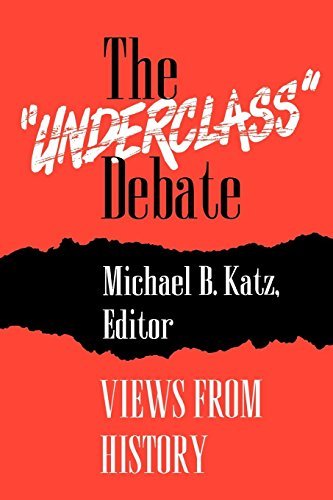
The "Underclass" Debate: Views from History (English Edition)
- 作者
- Michael B. Katz
- 语言
- 英语
- 出版社
- Princeton University Press
- 出版日期
- 2018年6月5日
- 纸书页数
- 520页
- 电子书格式
- epub,pdf,mobi,azw3,txt,fb2,djvu
- 文件大小
- 144212 KB
- 下载次数
- 6619
- 更新日期
- 2023-05-14
- 运行环境
- PC/Windows/Linux/Mac/IOS/iPhone/iPad/iBooks/Kindle/Android/安卓/平板
内容简介
Do ominous reports of an emerging "underclass" reveal an unprecedented crisis in American society? Or are social commentators simply rediscovering the tragedy of recurring urban poverty, as they seem to do every few decades? Although social scientists and members of the public make frequent assumptions about these questions, they have little information about the crucial differences between past and present. By providing a badly needed historical context, these essays reframe today's "underclass" debate. Realizing that labels of "social pathology" echo fruitless distinctions between the "deserving" and "undeserving" poor, the contributors focus not on individual and family behavior but on a complex set of processes that have been at work over a long period, degrading the inner cities and, inevitably, the nation as a whole.
How do individuals among the urban poor manage to survive? How have they created a dissident "infrapolitics?" How have social relations within the urban ghettos changed? What has been the effect of industrial restructuring on poverty? Besides exploring these questions, the contributors discuss the influence of African traditions on the family patterns of African Americans, the origins of institutions that serve the urban poor, the reasons for the crisis in urban education, the achievements and limits of the War on Poverty, and the role of income transfers, earnings, and the contributions of family members in overcoming poverty. The message of the essays is clear: Americans will flourish or fail together.
The "Underclass" Debate: Views from History (English Edition) EPUB, PDF, MOBI, AZW3, TXT, FB2, DjVu, Kindle电子书免费下载。
- 八分之七的冰山:海明威传(纪念海明威诞辰120周年) 弗娜·卡莱、周琳琳
- The Demography of Corporations and Industries (English Edition) Glenn R. Carroll、Michael T. Hannan
- 爱的教育(著名夏丏尊先生流芳90年经典译本,享誉世界的儿童文学读物) 亚米契斯、夏丏尊
- 面对心中的巨人(在重压下轻松临阵,在危机中反败为胜) 路卡杜
- 做人做事说话恰到好处全集 何诚斌
- 不再约会 约书亚•哈里斯(Joshua Harris)、叶蝉芬
- 新编从政之要900句 晓山
- 焦氏易林注(第三版)(套装共2册) 焦延寿
- Debt, Development, and Democracy: Modern Political Economy and Latin America, 1965-1985 (English Edition) Jeffry A. Frieden
- Clausewitz and the State: The Man, His Theories, and His Times (English Edition) Peter Paret
- Aaron Copland and His World (The Bard Music Festival) (English Edition) Carol J. Oja、Judith Tick
- 强爸爸 好女儿 :父亲决定女儿一生的10个秘密(帮助父亲加强或重建与女儿的关系,并由此塑造和改善女儿的一生) 梅格米克
- Conservation: Linking Ecology, Economics, and Culture (English Edition) Monique Borgerhoff Mulder、Peter Coppolillo
- Culture Moves: Ideas, Activism, and Changing Values (English Edition) Thomas R. Rochon
- 顺势教养(针对家长在日常生活中教养孩子时遇到的30个常见、具体的问题而写) 张淑芬
- 圣经人名辞典(汉英对照) 白云晓
- 欲望心理学(洞悉人与人之间的欲望冲突,掌握人际交往中的主导权!从欲望洞见人性,揭开交际行为背后的深层动机。) 华生
- 别让拖延症害了你的孩子(轻松9步,让孩子彻底摆脱拖延症。) 郝秀
- 感受的分析 訾非
- Nine Crazy Ideas in Science: A Few Might Even Be True (English Edition) Robert Ehrlich
- 职场色商(10分钟色商自我评估,让你找准自己的性格类型与职业方向) 索亚·泽奇、安·毕度
- Earthshaking Science: What We Know (and Don't Know) about Earthquakes (English Edition) Susan Elizabeth Hough
- 经典普洱(修订版) 石昆牧
- 发现孩子天生气质:揭开天赋密码.实现因材施教(运用经典理论,认识九大气质向度;帮助父母走出教养无力感,让孩子成为最好的自己) 张黛眉
- Twice upon a Time: Women Writers and the History of the Fairy Tale (English Edition) Elizabeth Wanning Harries
- 人可能进化的心理学(以第四道体系为基础,阐述了对于近代心理学以及进化论的颠覆性认识) 邬斯宾斯基
- 卵巢的秘密(一位站在卵巢研究前沿的生殖科学家,帮你解决不孕、难孕问题,延缓卵巢衰老,做健康、美丽的女人!北京和睦家医院院长盘仲莹温情推荐!) 王淑芳
- 祖言:中国戏曲谚语说要(酒香也怕巷子深——戏曲艺术的昨日今天) 刘克定
- In the Shadow of Revolution: Life Stories of Russian Women from 1917 to the Second World War (English Edition) Sheila Fitzpatrick、Yuri Slezkine
- Engineers of Happy Land: Technology and Nationalism in a Colony (Princeton Studies in Culture/Power/History) (English Edition) Rudolf Mrázek